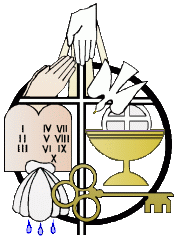
Xrysostom's Home
Ask the Pastor
Lutheranism
General Christianity
General & World Religion
Christian Computing
Culture
Fun'n'Games
+ + +
Things I've Written:
Ask the Pastor Blog
ATP Column Archives
Lutheran History
Lutheranism Compared
St. Paul: A Chronology
Luther: A Chronology
J. S. Bach, Lutheran Theologian
Bible Subject Reference
Church and Lodge Compared
Why Suffering and Death?
+ + +
Others' Writings:
The God of the Koran
+ + +
Click on Martin Luther's Seal to Order Lutheran Literature from Amazon.com

+ + +
Current and Former Calls:
Holy Cross, Emma, MO
St. Paul, Jasper, TX
Faith, Woodville, TX
+ + +
CAT41

+ + +
Lutheran Church - MO Synod
+ + +
The L.O.M.L.
+ + +
Mail Me!
+ + +
Site Statistics
+ + +
+ + +
|
+ + +

A Comparison of Lutheranism
with Other Churches
by Pastor Walter P. Snyder (XRYSOSTOM)
 You'll see resemblances to certain other Christian bodies among the Lutherans. We believe above
all else that Jesus Christ is our only Savior from sin, and that we are saved by grace alone,
through faith in Christ Jesus. Human works, no matter how good, are believed to be the result of
salvation, not its cause.
You'll see resemblances to certain other Christian bodies among the Lutherans. We believe above
all else that Jesus Christ is our only Savior from sin, and that we are saved by grace alone,
through faith in Christ Jesus. Human works, no matter how good, are believed to be the result of
salvation, not its cause.
The Lutheran Church is Biblical. We hold that the Bible is the only source of Christian teaching (doctrine). It decides what and how we believe, teach, and confess. In this, you'll see a strong resemblance to many "Bible-believing" churches. The Lutheran Church - Missouri Synod, of which I am a member, states that the Bible is divinely inspired by the Holy Spirit, and that it is truly the Word of God, and does not lie or contain error.
While the Bible is the source and norm of our doctrine, its teachings are spread throughout its books. By consolidating and clearly proclaiming these doctrines, we are also Confessional. Our confessions (statements of belief) are drawn from Scripture alone. These teach specific applications of God's Word to many different situations. We believe that these confessions are true expositions of the Word. As does the Bible, so the confessions point to Christ as our Savior and justification by grace through faith as the chief doctrine of the Church. Our confessions include the three Ecumenical Creeds (Nicene, Athanasian, and Apostles'), the Small and Large Catechisms, the Augsburg Confession, and other documents, which are contained in the Book of Concord of 1580.
Here in America (and probably around the world), even among many Lutherans, Lutheranism is considered to be a denomination--one among many. As such, denominations are on pretty much equal footing with each other. Lutheranism--true Lutheranism--is a confession, not a denomination. It is not the name, nor the external rites, that truly distinguish, nor divide those who claim to be part of Christendom. True Lutherans confess the true faith of the Holy catholic (universal) and apostolic church that has always existed whether it was called Israel or Christian (first at Antioch).
These roots mean that Lutherans are Liturgical. We follow an orderly and ancient pattern in our worship. With our hymns, Scripture readings, sermons, and the Lord's Supper, we also sing songs and chants from the worship of the Old and New Testament churches. On any Sunday, literally millions of Lutherans around the world may, in their own languages, be singing and praying the very same thing. It binds together a wide spread church. The liturgy is not meant to be stiff and stuffy, but it is formal. It speaks of the mystery and the majesty of God. In this area, we most resemble the Roman Catholic, Anglican-Episcopal, and Eastern Orthodox Churches.
 Like these churches, Lutherans are also Sacramental. Along with preaching the Word, we
practice Confession and Absolution, Baptism, and the Lord's Supper according to their Scriptural
institution, believing that by them, the Lord forgives sins and strengthens faith. We confess that
God uses even base, mundane physical means to impart forgiveness of sins, to bring those dead in
sin to life in Christ, and to sustain that life until life eternal.
Like these churches, Lutherans are also Sacramental. Along with preaching the Word, we
practice Confession and Absolution, Baptism, and the Lord's Supper according to their Scriptural
institution, believing that by them, the Lord forgives sins and strengthens faith. We confess that
God uses even base, mundane physical means to impart forgiveness of sins, to bring those dead in
sin to life in Christ, and to sustain that life until life eternal.
In Confession and Absolution, the commission Christ gave his Church to forgive sins is carried out by his pastors among those who confess their sins and profess faith in Jesus. This is done in corporate worship and in individual settings. We believe that the pastor's word of forgiveness is as sure and certain as if Jesus himself were speaking. Confession is more than clearing a guilty conscience; with Absolution (forgiveness), it is God restoring us to his good graces and a right relationship.
We believe in baptismal regeneration. Holy Baptism is not seen as a symbolic act, nor as something one does to join the Church. Instead, we confess that God uses Baptism to join people to his Church. We believe that Christ's words with this water give us forgiveness of sins, new life, and salvation. We baptize infants, since we believe from the words of Scripture that they are born in sin and in need of Christ's forgiveness and the new life he gives in Baptism.
 We highly regard the Lord's Supper, confessing that we do not receive only bread and wine to
remember Christ's sacrifice, but that miraculously we receive the very body and blood of Christ.
We believe that through eating and drinking this Supper our sins are forgiven, our faith is
strengthened, and our selves are joined ever more closely with our Savior. We are thus taken into
closer communion with the Father, who is one with Christ. We are also brought into closer
communion with brothers and sisters in the faith--the body of Christ. We do not believe only that
Communion brings unity (see 1 Corinthians 10:17), but also that through unity of doctrine we
have true communion in the Lord's Supper (see Acts 2:42); thus, our union in the Body of Christ
is strengthened. This unity comes not because we decide to share something, but because of what
Christ is sharing with us.
We highly regard the Lord's Supper, confessing that we do not receive only bread and wine to
remember Christ's sacrifice, but that miraculously we receive the very body and blood of Christ.
We believe that through eating and drinking this Supper our sins are forgiven, our faith is
strengthened, and our selves are joined ever more closely with our Savior. We are thus taken into
closer communion with the Father, who is one with Christ. We are also brought into closer
communion with brothers and sisters in the faith--the body of Christ. We do not believe only that
Communion brings unity (see 1 Corinthians 10:17), but also that through unity of doctrine we
have true communion in the Lord's Supper (see Acts 2:42); thus, our union in the Body of Christ
is strengthened. This unity comes not because we decide to share something, but because of what
Christ is sharing with us.
Both because of the unity which the Lord's Supper brings and because of the unity that is called for in partaking of the Supper, we practice closed (or close) communion, wherein the pastor examines those who desire to commune before admitting them to the altar. This is for the benefit of the individual, so that one does not eat and drink to his or her harm (1 Corinthians 11:27-29). It is also for the Church, so that it does not incorporate into itself those who ignore the Real Presence of Christ in the Supper or despise the forgiveness of sins which is Christ's gift in this eating and drinking (1 Corinthians 10:17-22).
To find out more about Lutheran teachings or to ask other questions about the Christian Church, "Ask the Pastor."
Page designed by Walter Snyder as part of the Xrysostom family of Web pages. This page © 1997 by Walter P. Snyder. Originally posted 2 September 1997.
